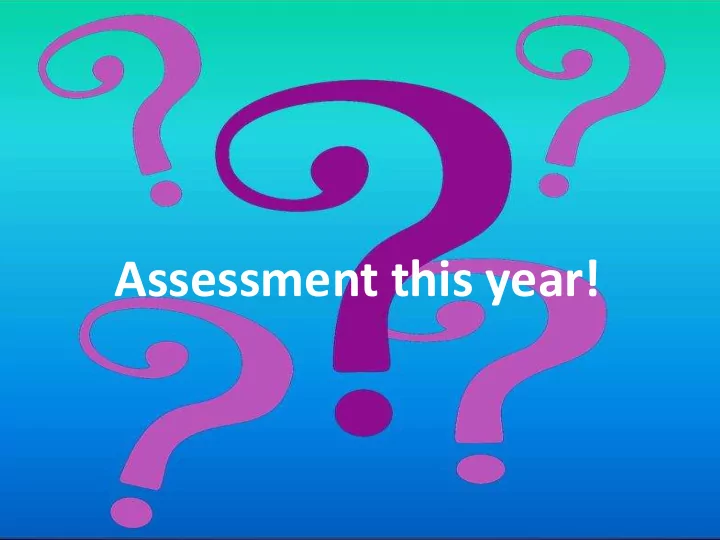

Assessment this year!
Ye olden days….last year We used to have levels which were created as broad statements. Levels were invented in order to: • be used periodically as a check on standards • provide detailed level descriptions useful to help teachers consider gaps in pupils’ learning and plan next steps
What happened? • level every single piece of work • label children (‘he’s a 3c’) • use level descriptors as children's targets or as success criteria • Break down levels into sub levels • Create tick lists and algorithms to dictate level and progress points • Differentiate lessons according to fixed pupil groups, based on their levels
What we don’t want …?
What we don’t want …? When I grow up, I want to be a 4a!
What we don’t want …? When I grow up, I want to be a 4a! Government Commission found them to be unfit for purpose
What do we want? Well motivated, enthusiastic learners who achieve high personal standards. Levels became restrictive
The Department for Education said… As part of our reforms to the national curriculum, the current system of „levels‟ used to report children’s attainment and progress will be removed. We believe this system is complicated and difficult to understand , especially for parents. It also encourages teachers to focus on a pupil’s current level, rather than consider more broadly what the pupil can actually do . Prescribing a single detailed approach to assessment does not fit with the curriculum freedoms we are giving schools. • (Department for Education)
And they replaced levels with….
…nothing!
…nothing!
Teachers Ofsted will still need to see robust evidence that pupils are making good progress in learning Teachers will be assessing in class to promote learning and ensure that what is being taught is what’s needed to achieve Age Related Expected standards in each Year Groups and by the end of each Key Stage
Accountability… • National standardised assessments provides a starting point for Ofsted’s discussions about a school’s performance • Benchmarking against other similar schools • Achievement & progress – transfer between schools • National assessments/tests for (Baseline) Yr. R, Phonics Yr. 1, Yr. 2 and Yr. 6 will be undertaken.
What are we assessing against? • No levels in the new National Curriculum • End of Year 2, 4 and 6 Expectations for all subjects • SATs – Reading, Writing, Spelling, Punctuation & Grammar and Maths
This end of Year 2 ……… New end of KS 1 assessment tests (SATs) These are administered and marked in school during May 2016 Teachers Assessments. Based on the pupils’ curriculum work over time
Formal Tests New for this year. • 2 English Reading Papers • Spelling Test • Grammar & Punctuation Test • Maths Arithmetic Test • Maths Reasoning Test
Arithmetic (20 minutes) • www.gov.uk/government/uploads/system/upl oads/attachment_data/file/439520/Sample_k s1_mathematics_paper1_arithmetic.pdf
Maths Reasoning (35 minutes) • https://www.gov.uk/government/uploads/syst em/uploads/attachment_data/file/439522/Sa mple_ks1_mathematics_paper2_reasoning.pd f
Spelling (15 minutes), Punctuation and grammar. (20 minutes) • https://www.gov.uk/government/uploads/syst em/uploads/attachment_data/file/439443/Sa mple_ks1_EnglishGPS_paper1_spelling.pdf • https://www.gov.uk/government/uploads/syst em/uploads/attachment_data/file/439447/Sa mple_ks1_EnglishGPS_paper2_questions.pdf
Reading (Two papers 30 minutes and 40 minutes) • https://www.gov.uk/government/uploads/system /uploads/attachment_data/file/439482/Sample_ ks1_Englishreading_paper1_promptanswerbooke t.pdf • https://www.gov.uk/government/uploads/system /uploads/attachment_data/file/439485/Sample_ ks1_Englishreading_paper2_answerbooklet.pdf
Results will be reported to you (and others) • Not with levels • Terms ‘At Age Expected’ (ARE) • Below and above ARE • Tests will use Scaled Scores • 100 will be Age Expected. • It has been said that the range for the Scaled Scores will be 75 to 130 • The raw score which equates with 100 has not been set. • It will change year on year.
Teacher Assessment • This last month the Government has released the criteria by which staff have got to judge the performance of the children. • And it is still being changed!
Interim standards • These are not a best fit judgement but all of these need to be achieved for any child to be deemed to be working at Age Expected. • https://www.gov.uk/government/uploads/syst em/uploads/attachment_data/file/461547/Int erim_teacher_assessment_frameworks_at_th e_end_of_key_stage_1_PDFA.pdf
Teacher Assessments • Exemplary materials were late being issued • Writing; there is still discussion around some of the requirements and debate around the use of exclamation marks in the writing compared to in the test.
At Age Expected • https://www.gov.uk/government/uploads/syst em/uploads/attachment_data/file/498558/ST A-Exemp2016-KS1-EW-Sam-NoAnn.pdf Above Age expected • https://www.gov.uk/government/uploads/syst em/uploads/attachment_data/file/498548/ST A-Exemp2016-KS1-EW-Ali-NoAnn.pdf
This year ….. • Nationally it is expected that there will be a huge discrepancy between Teachers Assessments and Tests. Why?
Summary • Pupils are being taught well by staff who are passionate about learning. • Your children are being taught what they need to know to ensure that they advance their learning.
Summary Assessments • No Levels • New more formal Tests not tasks or tests which support judgements. • Scale Scores • Everything has become more challenging e.g.. last year 2b = expected and 3c = above expected It appears that this year ARE is more in line with a 3b
How can you help ? • Reassure your child to try their hardest but not worry.
• You can support you child by reading with them and reading to them. Helping them learn the times tables and Kirfs/Smirfs. • If you wish to purchase additional revision materials Collins and Letts do good revision guides for the 2016 curriculum.
Recommend
More recommend